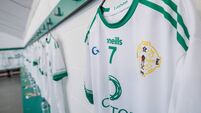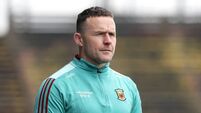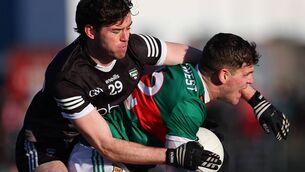A century of success, linked by bloodlines and DNA
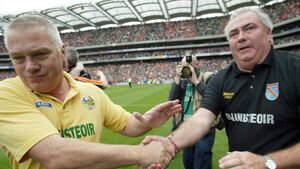
Joe Kernan is congratulated by Paidí O Sé following the 2002 All-Ireland SFC Final between Armagh and Kerry. Both men have links to their counties recent successes Picture: INPHO/Morgan Treacy
Kerry’s thirty ninth All-Ireland victory saw a host of records broken or reaffirmed. Winning an All-Ireland every decade since 1900, winning the 1984 Centenary Final, the 2000 Millennium Final, the 2025 final under the new rules making them red letter figures. So, what is it that drives them?
Ability to change and adapt like in 1975 after Heffo's Dublin Blue Army broke the old rigid mould? Yes and no. Antrim, believe it or not, tried to break the mould in 1946. They developed a rapid hand passing game that took them to that year’s All-Ireland semi-final. Kerry decided that type of game wasn’t ready for modernity and fouled and hacked their way to a three-point victory, a ploy readily admitted by Kerry players from that era. Needs must and Kerry needs All-Irelands.
They went through this year’s league undercover, almost reluctantly winning it. Jack O’Connor has since stated that it was only after that was wrapped up that they looked seriously at the new rules and two pointers. Change and adapt? Yes…successfully.
So, is there anything else? The answer is a resounding yes. Hard to quantify and replicate but defiantly there. It’s the Kerry bloodline and DNA. The county and its players are judged on one thing only: winning Sam. One All-Ireland medallist and you’d need a passport to state your credentials, four and you’d turn a head, five maybe free pints, six seven or eight free dinners perhaps. At the 2014 All-Stars awards player of the year James O Donoghue on receiving the award stated that he was glad to shed one thing, being the only the second ever Kerry player to have won an All-Star but not an All-Ireland medal. Connie Murphy still stands alone on that lonely outcrop with his 1989 award as O’Donoghue picked up that cherished gold Celtic Cross that year.
Since 1924 to 2025, one hundred and one years and starting with that 1924 All-Ireland winning team, we find a direct line where a player from the previous winning All-Ireland winning team successively linked to the next winning team right down to this year. Con Brosnan started the bloodline in ’24 and featured in six winning All-Ireland Kerry teams 1924/26/29/30/31/32 where he was joined by Dan O’Keeffe who rolled it on from 1932/37/39/40/41 where in 1946 he was joined by Jackie Lyne.
A “famine’ ensued until 1953 where Lyne was the only survivor of that ’46 team who was joined by JM Palmer who rolled it onto 1955 where he was joined by Johnny Culloty who added 1959/62/69/70 when Brendan Lynch came aboard and who in 1975 was the only survivor from Mickos cull that would challenge Dublin.
In 1975, there were many who would drag Kerry through 1978/79/80/81/84/85/86. I choose Páidí Ó Sé as the standard bearer. Lucky for Kerry in ‘86 that they named Stephen Stack as a substitute.
Another longer ‘famine’ occurred, and it would be Stack who bridged 1986 with 1997; of course, Paidí was manager. Seamus Moynihan and Dara Ó Sé bridged to 2000 when Tomás Ó Sé anchored them through 2004/06/07/09 and brothers Marc and David Moran took them up to 2014 when joined by Paul’s Murphy and Geaney, who bridged the Sky Blue Sky until 2022 and 2025. That’s thirty-four All-Ireland’s bloodlined linked over a century. Only twice, the 1990s and then 2010/20 have they failed to pick up more than a single title in a decade.
So, bloodline and hands on knowledge matter in the Kingdom, so does the followers demands that currency is measured in All-Ireland wins, not selfies and signing kids’ jerseys and Instagram hits. Paidí, eight-time All-Ireland winner as a player, twice as a manager plus an U21 title and a handful of leagues. Two seasons after leading them to the 2000 All-Ireland title and a 2002 final loss to Armagh, P called them ‘the roughest type of f*****g animals and you could print that’. Different standards and different expectations. No pressure, no diamonds.
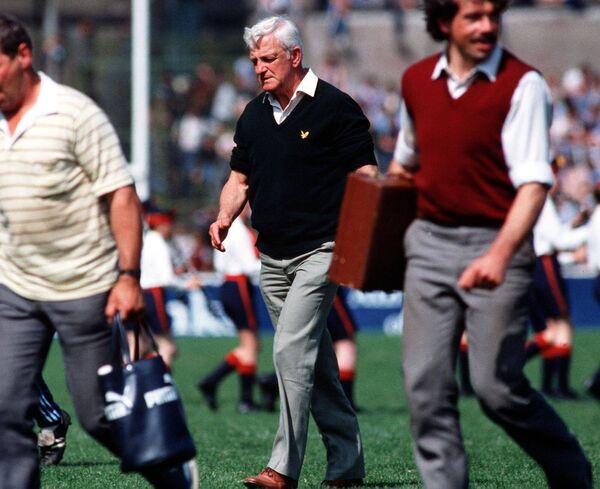
In the early 1950s, Dublin GAA decided that they would lessen the dependence on country lads coming in and focus on native born Dubliners. St Vincent’s was to be the original template for what’s now the Blue Dub revolution. Starting with the 1955 All-Ireland final loss to Kerry, a defeat that seared through the soul of Kevin Heffernan and drove him for decades, we also see connectivity and a clear bloodline. The 1958 All-Ireland win by Dublin saw Kevin as captain, with Dessie Ferguson the only link with the 1963 winning Dubs team. Cue a long slumber rudely awoken with the coming of a Heffo’s Army in 1974. Football and the GAA was dragged into the twentieth century at last.
The cult of the manager was born, uniformity in jerseys and kit. Tactics coming to the fore and the handpass forcing the game down a different route. No longer did the goalie just stand there. He took the knockouts and started to become an influence on the game.
We had moved from the selector days of 1950 when, allegedly, the Mayo selection board acceded to putting a man in goal with little or no experience for an All-Ireland final. A timely injury saved us all from embarrassment and the reward was our second title. Heffo, along with Micko, are the fathers of GAA modernity.
One of Heffo’s henchmen was Brian Mullins, a blonde towering giant who combined skills with steel. The 1974/76/77/83 titles bore his fingerprints along with Heffos. From the 1983 class came John O’Leary, who bridged the gap to 1995. That team had Dr Pat O’Neill from the 1974/83 era as manager. On his 1995 team were a trio: Pat Gilroy, Jim Gavin and Dessie Farrell. Between them they would stitch on the last nine All-Irelands for Dublin. Stephen Cluxton would be their standard bearer. The Blue Revolution is in abeyance….for now.
If we look at the next on the list for titles, Galway, the blood lines and DNA is clear to see. Not as regular or as defined as Kerry and Dublin but clearly evident. Their ‘first’ All-Ireland title was won in the boardroom, denying Mayo, the 1925 winners over Wexford, their title. Regardless, Micheal Donnellan set in train a dynasty that would pick up six of Galway’s subsequent nine wins on final day. Himself picking up one, sons Pat and Johneen adding a three-in-a-row from 1964-66 and Micheal, the grandson winning gold in 1996 and 2001.
The Galway DNA contains one, John ‘Tull’ Dunne, whose fingerprints are everywhere on the Galway spreadsheet. As a player Dunne won All-Irelands in 1934, bridging Donnelllan’s first in 1925 and captaining the 1938 winning team. Somewhere along the line he married organisational and boardroom nous with what was then called ‘Trainer’ but what we know today as ‘Manager’. In that role he led Galway to three All-Ireland Minor titles and was the Capo for the 1956/64/85/66 senior All-Ireland winning teams. Mattie MacDonagh bridged the 1956 team with the three-in-a-row of the 1960s. Tull Dunne’s own son Cyril was a standout forward on the three-in-a-row team with the aforementioned Donnellan’s who also appeared on the winning 1998/2001 winning teams. The link is clear and clearly DNA plays a part.
Next up is Meath with their seven titles. The 1949 title, their first ever has Peter McDermott as a player. He captained the next winning team in 1954, managed the 1967 winning team that saw the county add number three. Pat Reynolds was on that 1967 winning team. He was selector with Sean Boylan on the next winning teams of 1987/88. His son, Paddy was on the next winning Meath teams of 1996/99. Royal blue bloods? Noel Curran of the 1967 moved from Dunshaughlin to the Tallaght area of Dublin shortly after that ’67 victory. Travel being the issue regarding his work. His son Paul Curran won a Sam with Dublin in 1995. Dessie Ferguson went the opposite way after his 1963 Dublin All Ireland win. His son Terry added brace with his native Meath in 1987/88.
Cork’s five All-Ireland’s has the fingerprints of Billy Morgan on at least three of them. A goalkeeper on the 1973 breakout team, manager of the five-time finalists, twice winners between 1987 and 1993, Morgan was a driven presence mainly over Kerry’s perceived superiority. Billy was driven to down them. His squad of 1987/90 had Jimmy Kerrigan, whose son Paul bridged their last win of 1990 with another breakaway victory in 2010. The member of that 2010 team was their totemic player Conor Counihan of the 1987-93 era.
Tyrone were late to the DNA party. A first ever All-Ireland arrived in 2003, and the Red Hands passed Mayo out with their fourth in 2021. Mickey Harte started with the Tyrone Minors and U21 in the late 1990s, forging a bond of brothers through triumph and adversary culminating with the sad death of Cormac McAnallen in 2004, six months after the breakthrough final of 2003. Harte led them to three Sam’s by 2008, and Brian Dooher and Peter the Great were his on-field lieutenants. When Tyrone added number four in 2021, Dooher was manager and Peter’s son, Darragh, was on that team.
Which brings us to Donegal. Reached their first ever Ulster final in 1966. Cavan had won six All Irelands by then and Down two. Their first win was under the captaincy and player manager Brian McEniff in 1972. Subsequently he led them to their first five Ulster championships culminating with the 1992 All-Ireland victory. McEniff is the godfather of Donegal football. One of his substitutes in that 1992 victory was Jim McGuinness whom McEniff championed as manager for the job in 2011 despite county board misgivings, a season later Donegal’s second Sam was heading for the Hills. McGuiness still holds sway in 2025 though slightly bruised.
Finally, we come to another late arrival at the table: Armagh. The 2002 breakthrough victory was fashioned essentially by the Crossmaglen Rangers club, forged into steel by Joe Kernan. Armagh’s status was built bottom up via Crossmaglen. Joe led them to three All-Ireland club titles by 2000, with a brand of one for all, all for one football. The corner forward was the first line of defence once possession was lost.
In 2001 he took over the county senior team, leading them to the 2002 title with a one-point win over Kerry. When Armagh added number two in 2024, the 2002 captain Kieran McGeeney was manager.
That particular Armagh team under Joe’s influence spawned Enda McNulty, an eminent sports psychologist, his brother Justin a leading SDLP politician, Aiden O’Rourke, Óisín McConville and Tony McEntee as inter-county managers. Kernan’s sons all went on to play at the highest level. Though caught in the Kerry 2025 renaissance, one thinks that they more than Donegal or Dublin are the team to challenge the Kingdom come 2026.
And Mayo? Having spent a pleasurable evening many years ago with twice All-Ireland winner Mick Mulderrig, the two golden medals in his pocket before he was 22 by the way, his steely recollect painted a dismal picture of Mayo bloodlines. Telling me that after the 1955 replayed one point loss to Dublin, Mick had to make his way back into town courtesy of the Dublin team bus that dropped him off on O’Connell Bridge. For many years later, he was paraded in various Mayo dressing rooms as ‘the man who won an All-Ireland’. In the end, he formed the impression that the players hadn’t a clue who he was what he represented. He stopped coming. Part of me thinks when Mulderrig slipped into that 1955 late August evening on O’Connell Bridge, part of the Mayo DNA went with him.
We have the players, the followers and a record that is second to none for reaching finals. What is the DNA missing?
